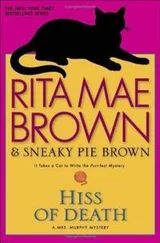“Maybe she didn’t have one.” Shaker lifted the lid off the big garbage can where treats were kept and refilled the two sides of the tool bag on his waist.
“She left a will. Hope was far too organized not to do so. She told me she was cutting Paul out of it,” Sister said.
“Some people don’t like to think about death.” Sybil shrugged.
“Does that mean you don’t have a will?” Sister picked up her crop and nudged her in the ribs.
“I have one. Daddy would kill me.”
“Darn straight.” Betty smiled. “I think I will call Dan after hound walk.”
“What will you do with the blue bomb?” Sybil asked.
“Sell it, I guess. I mean, it runs. I’ve kept it up. Put four new tires on last year and a new alternator. Car’s getting old; I’m getting old. I don’t feel like fooling with it. It’s an ’eighty-six, after all. The paint is so faded it looks as though it’s powdered with blue chalk dust.”
“Hey, I’m tired of waiting!” Dragon complained from the draw pen.
“Let’s get this show on the road.” Shaker smiled.
“Literally.” Sister laughed.
Tootie walked with Shaker. He’d taken a shine to her because she loved hounds and had the gift. Also, she hung on his every word.
“Can’t draw two strike hounds. You can for a walk but not for a hunt.”
“Why?”
“Split the pack.”
“That’s why you don’t take Cora and Dragon together?”
He smiled. “You noticed.”
“Not until the middle of last season, but I wondered.”
“You know, there are people who hunt for years and don’t know one hound from another.”
“But they’re quiet in the field, and that’s what counts,” Betty chipped in.
“And they pay their dues,” Sister added.
Bitsy, tiring of motherhood and feeling the nest was too small for four owlets, flew low overhead.
Tillie, the lemon-and-white draft from Mo Schneider’s pack, had become less shy. “Why does that screech owl hang around?”
Thimble, coming on her second year, felt important enough to answer. “Oh, that’s Bitsy. She lives in fear that she’ll miss something.”
“Ha.” Bitsy clicked her bill, careful not to emit her signature call. “Groundling. I see and know more than you could ever dream of. Dumb hounds.”
With that she pooped on Thimble’s head before flying over near Inky’s den.
The other hounds laughed at Thimble, who, good-natured, laughed, too.
Mist rose up from the wildflower field, long white streaks obscuring vision and then magically thinning into a pearly haze until they vanished altogether in a startlingly blue sky.
After an hour’s walk, with everyone back in their respective runs, Betty called Dan on her cell. Hope’s 2007 CV70 all-wheel-drive turbo retailed for $28,750. Dan had just put an ad in the paper.
“Dan, what about twenty-six thousand, and I’ll bring you a check today?”
He thought about it. “Done. Make it out to the clinic.”
Betty hung up. “I’m the new owner of a station wagon with only thirty-four thousand miles. I really love the color, that light mist-green metallic.”
“I do, too,” Sister agreed.
“What will you do with the blue bomb?” Tootie quietly inquired. “Get whatever I can for it.”
“I’d like to buy it.”
“I’ll jump it and take it to Tommy Harvey’s. He can check it out for you and sell you a new battery. His prices are always fair.” Shaker liked doing business with people who did what they said they were going to do.
“Actually, that’s a perfect place to take the wagon. Tommy’s got all the records,” Betty said. “He can tell you what it’s worth. Then maybe your dad will give you the money.”
“I’m not asking Dad for anything. I’ve saved up.” Tootie’s voice rose a bit. “Dad’s paying for college. That’s enough.” She paused. “I wish I could stay here.”
“You just go on to Princeton.” Betty was firm. “Those four years will fly by. Then you can think about coming back to live.”
“Mary Baldwin is just over the mountain.” Tootie sounded plaintive. “I’d be happy there.”
“Princeton is a fabulous school. You’ll like it once you get used to it. New Jersey is so crowded. Not much real country left.” Betty truly was delighted with the deal she’d just made and was feeling expansive. “And the blue bomb knows the way home. So whatever price Tommy gives you, that will be it.”
“Okay.”
The four women walked out into the warming air, feeling the rise in humidity. Shaker jump-started the Volvo.
“Tootie, just in case this takes more time than we think, I’ll follow you there,” he offered.
“Thank you.” Tootie smiled, her teeth so white that they almost seemed fake.
“Lot of wheeling and dealing going on. Too much for me. I’m going to attack the Japanese beetles.” Sister headed toward her garden shed.
“Don’t say that,” Sybil said in mock terror. “I haven’t seen one beetle yet.”
“That’s because they’re all here with me.”
That night, Tootie pored over her savings account, a total of one thousand five hundred dollars to withdraw. Betty was selling the blue bomb to her for less than Tommy’s evaluation.
At home, Betty was feeling a tremor of attachment. She’d had that Volvo when it was new, the Copen-blue paint shining, the interior without a spot of wear. Still, one must move on.
She opened all the cubbyholes and storage places in Hope’s 2007 Volvo, pulling out little notebooks and odd pieces of paper.
“Bobby, look at these numbers.” She handed him bits of paper.
“Huh?” He’d been reading the newspaper and reached absentmindedly for the papers.
“See?” Betty said.
“See what?” A flicker of irritation crept into his voice, for the day at the print shop had been a long one.
“Look at these order numbers.” She bent over him, pointing over his shoulder. “That’s the number for pure red ink. These are paper numbers, Strathmore mostly.”
He sat up a bit straighter, put the newspaper in his lap with his left hand, and brought the small paper slips up to his eyes with the right. “I’ll be damned. So it is.”
“What was Hope Rogers doing with all that paper and ink?”
“Well, honey, maybe she was planning some kind of an invitation for a party.”
“She would have come to us. We give our hunt club members and vets a discount—a very attractive discount, I might add. Your idea.” She sweetly gave him the credit, even though the idea had been a mutual one thirty years ago, when they were young and just starting their printing business.
“Betty, she died first.”
“I don’t think so. For one thing, these little scraps are old. See?” She pointed out the grease spots from Hope’s fingers, yellowing at the edges on some papers. “She’s had these for at least a year.”
Bobby was as good a judge of aging paper as his wife. “That doesn’t mean anything, honey. She could have had an idea about stationery or some announcement for the clinic and set it by.”
“I still think it’s odd.”
“Well, maybe, but why do you care?” He looked at her quizzically.
“Maybe this will help us understand what really happened to her.”
While Betty retreated to the kitchen to call Sister, Bobby wondered how his wife thought ink colors and paper types could shed light on Hope’s demise. However, he’d been married to her long enough not to voice this question.
“I can’t make head or tail of it,” Sister said, after hearing Betty’s report.
“If there were just a few numbers, I’d go with Bobby’s thought that Hope had planned some form of announcement or whatever for the clinic. But there are a lot of numbers here, for ink and specific paper types. And it’s not like she was comparing two reds or two blues. She’d obviously made up her mind.”
Читать дальше












